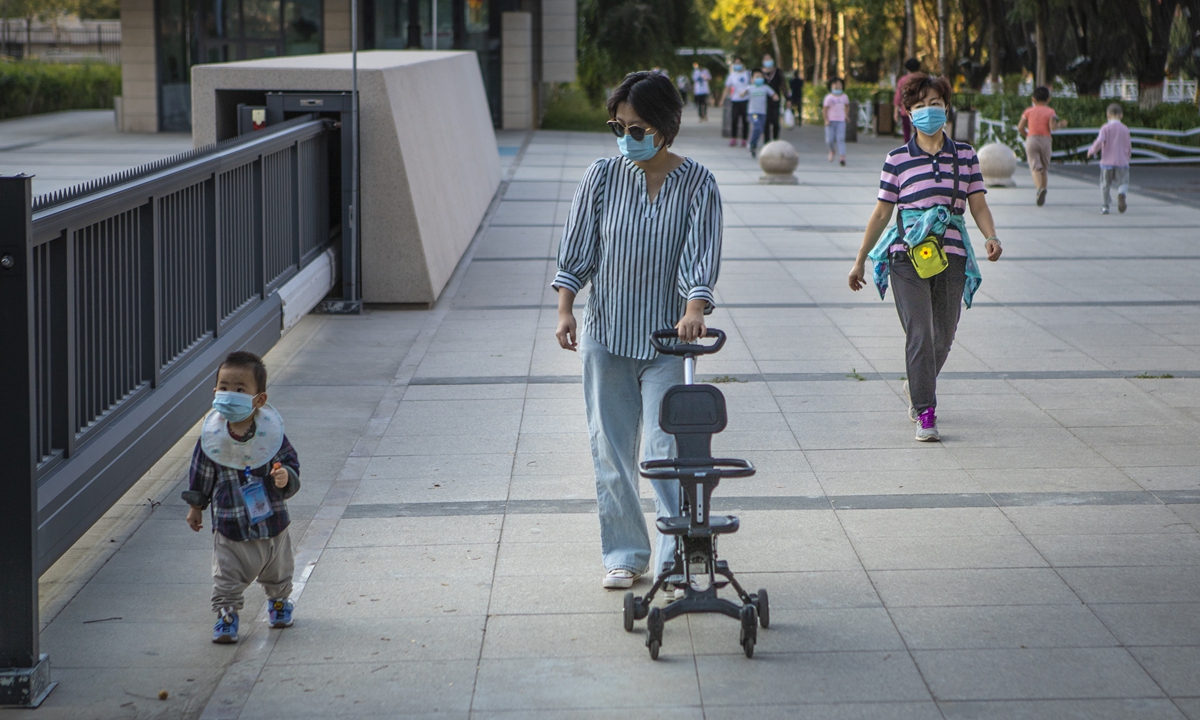Narrow-minded attacks on Xinjiang prompt boycott of 'Mulan': analysts
By Liu Caiyu Source: Global Times Published: 2020/9/8 21:13:41

After pressing the "pause button" for more than 45 days, Northwest China's Xinjiang Uygur has restarted. Thanks to the residents' cooperation, the COVID-19 outbreak has been brought under control. The photo shows residents in Urumqi enjoying the outdoors. Photo: VCG
Amid a new round of boycotts against the Disney film Mulan for its credit to Xinjiang regional government organs, including the public security bureau, analysts mocked anti-China forces' narrow mindset, which they said failed to recognize the dynamic and diverse nature of Xinjiang society, and the only thing they knew was to smear the vocational education and training centers.
The film, which was attacked by Hong Kong secessionists over the lead actress Liu Yifei's support for Hong Kong police last year, thanked eight government organs in the Xinjiang Uygur Autonomous Region, including the Turpan public security and cultural heritage bureaus, which helped Disney shoot some scenes in the region.
Some media organizations, including the BBC and the Guardian, reported that Disney is being criticized for giving such credit, as the Turpan public security bureau is involved in the operation of vocational education and training centers. The reports quoted so-called China expert Adrian Zenz heavily.
Zenz, who many anti-China forces have used as a source, is recruited by the US intelligence organizations to conduct studies of Xinjiang. He makes a living by fabricating rumors about Xinjiang and defaming China, Chinese Foreign Ministry spokesperson Zhao Lijian said on Tuesday.
Crediting organizations and individuals that helped in the production of a film is common industry practice, and public security bureaus, culture and tourism departments, and publicity organs are usually the authorities that coordinate shooting work on city streets or at scenic sites, said Shi Wenxue, a Beijing-based film critic, noting it is sad to see a film being hijacked repeatedly for political purposes.
The production designer Grant Major of Mulan told Architectural Digest magazine that his team spent months in and around Xinjiang to do legwork and research before the cameras rolled and they also consulted Chinese academics.
Major said thanks to the meticulous detailing, layouts and structures of the local buildings, they were able to make the scenes in the film feel right.
Anti-China forces failed or intentionally ignored the aesthetics of film production, the multiple roles public security organs played in China, and the diversity of Xinjiang society, focusing solely on using the vocational education and training centers to attack the Chinese government, analysts said.
"Anti-China forces have become addicted to targeting China's policy in Xinjiang and the vocational education and training centers over the years, like some addicts who cannot help using drugs," Zhu Weiqun, former head of the Ethnic and Religious Affairs Committee of the National Committee of the Chinese People's Political Consultative Conference, told the Global Times on Tuesday.
It is a pity that they could not see the true Xinjiang, or get a broader vision of the region where people enjoy life, tourism is booming and the social environment is stable. Their distorted mindset makes them blind, Zhu said.
In 2019, Xinjiang received a record 200 million tourists and generated revenue of 340 billion yuan ($49.7 billion), both up 40 percent from the previous year.
Actually, what Western media call "re-education camps" or "detention camps" do not exist in Xinjiang. The vocational education and training centers in Xinjiang aim to help those who are influenced by terrorism and extremism to return to the right track, obtain work skills and become employed.
But foreign media kept ignoring the truth and hyping the issue after all trainees graduated in late 2019, analysts said.
Xinjiang residents have the biggest say in the true Xinjiang and "no matter what exterior voices say, China's resolution of maintaining the stability and prosperity of the region is unshakable," Zhu said.
Posted in: SOCIETY